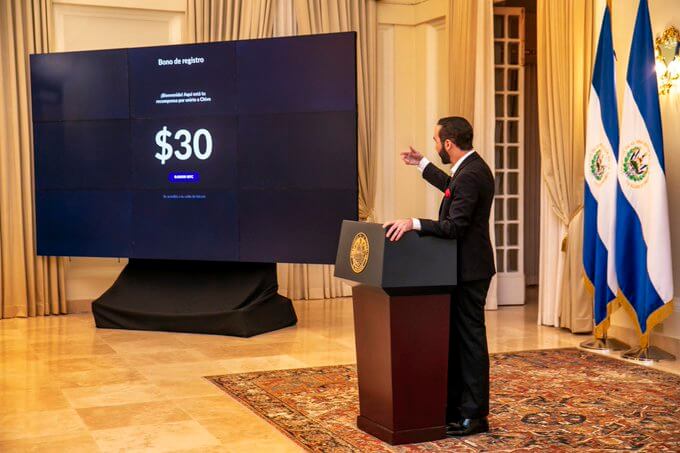Jack Mallers, the CEO of Bitcoin wallet firm Strike, worked with the El Salvadorian government as an advisor on Bitcoin infrastructure.
This entailed living in the country for three months to decide policy on solving “spillover” of monetary expansion and inflation of the dollar and how to deal with financial inclusion in a country where 70% of people are unbanked.
But the idea of Bitcoin as legal tender is being shunned by certain sections of the international community. With that, it’s becoming increasingly clear that organizations holding this view do not want freedom from inflation or financial inclusion.
Bitcoin as legal tender is going ahead despite international snub
During a national address on Thursday, El Salvador’s President Bukele said the recently passed Bitcoin bill would take effect on September 7. He added that the use of Bitcoin is optional.
“The use of Bitcoin will be optional, nobody will receive bitcoin if they don’t want it… If someone receives a payment in bitcoin they can choose to automatically receive it in dollars,” he said.
President Bukele also unveiled details of the national wallet, as developed by Strike, which has been named “chivo.” This is slang for great or cool and is a word that has positive connotations.
Registering a wallet entitles the user to a $30 airdrop, and it provides instant USD to BTC, or vice versa, conversion. Also, as an open system, BTC can be transferred in and out via compatible wallets.

Speaking to Fox Business about the wallet, Mallers said Strike’s role was to build infrastructure that taps into the Bitcoin network to bring about freedom and financial inclusion.
“The solution was, can we plug into this open monetary network, a monetary policy that’s distributed and protected by a network of peers and reinstil basic human freedom and financial inclusion for the country.”
This involved advising on the legal tender bill and building the necessary software to make the above happen.
Regarding the difficulty of implementation, especially doing it on a country-wide scale, Mallers said it was relatively easy as Bitcoin is an open system and the technology already exists. He said it was simply a case of optimizing it and putting it into place “for a country that’s been relatively abused by the system.”
Anchor claims El Salvadorians could lose everything
On the matter of “going it alone” without the support of the IMF and World Bank, Mallers responded by questioning why the IMF and World Bank would oppose enabling financial access and improving quality of life.
“You know what Liz, I wonder why they’re upset…”
At this point, the interview turned heated as the anchor claims El Salvadorians could “lose everything.” She cited instances involving locked-out accounts and the recent South African exchange exit scam.
To his credit, Mallers isn’t sucked into the misconceptions that no-coiners often have. Instead, he refers back to the IMF and World Bank, implying a campaign to discredit Bitcoin as it is fundamentally different from the system these organizations uphold.
“I think it says a lot more about the folks who are against basic human freedom, and plugging into an open system than it is those who are fighting for human freedom,” he said.
Mallers rounded off by saying El Salvador is plugging into a system that offers hope and a better future for its citizens.
Get an edge on the cryptoasset market
Access more crypto insights and context in every article as a paid member of CryptoSlate Edge.
On-chain analysis
Price snapshots
More context
Like what you see? Subscribe for updates.


